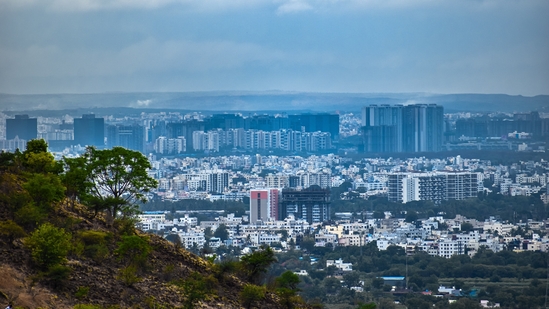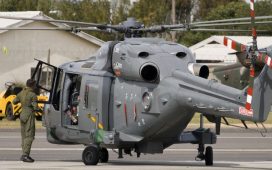Wellington , Defence Minister Rajnath Singh on Thursday said technology was driving geopolitics and national security like never before and observed that traditional notions of warfare are being rewritten.

The power of technological innovation in combat theatres is “breathtaking”, he said in his address at the convocation ceremony of the 80th course of the Defence Service Staff College here.
“Technology today is driving geopolitics and national security like never before. AI and the emerging basket of technologies – robotics, military autonomy, dronery, quantum, block chain, space, cyber, electronics, additive manufacturing and the like, are revolutionizing deterrence and war fighting in critical ways. Warfare is moving rapidly, beyond the traditional domains of land, sea, and air, to space, cyber, the undersea and newer domains of creative endeavor,” he said.
“Dronery, for instance, has emerged in Ukraine-Russia conflict, virtually as a new arm, if not a transformative science. The majority of losses of soldiers and equipment have been attributed neither to traditional artillery nor to armour but to drones. Space capacities in the Low Earth Orbit, similarly, are transforming military intelligence, persistent surveillance, positioning, targeting and communications – thus taking combat to a new high. The power of technological innovation in combat theatres is breathtaking indeed,” Singh said.
He further said the ongoing conflicts and contemporary trends highlight the fact that the traditional notions of warfare are being rewritten.
“Emerging technologies are impacting the character of war with unmanned systems and advent of AI forecasting, an era of Autonomous Warfare. Warfare today has gone beyond the traditional battlefields of land, sea, and air. Armed forces will increasingly need to operate jointly in a multi-domain environment where cyber, space, and information warfare will be as potent as conventional operations.
“We are in the age of Grey Zone and Hybrid warfare where Cyber-attacks, disinformation campaigns, and economic warfare have become tools that can prosecute and achieve politico-military aims without a single shot being fired,” he said.
India, and for that matter the world, faces a diverse range of security challenges.
“In our case, we face persistent threats along our northern and western borders. This is further compounded by the threat of proxy war and terrorism emanating from the epicenter of terrorism in our neighbor-hood. Ongoing conflict in West Asia and the geo-political tensions in the Indo Pacific to our East have their impact on our overall security calculus. In addition, capability to address non-traditional security threats to include natural disasters and climate change effects are increasingly becoming important,” he said.
The global geo-political situation, he said, was marked by tremendous flux, with rapidly shifting alignments, disruptions and conflicts being the order of the day.
“Issues such as deglobalisation, intense nationalism, resource scarcity, human migration, food security, climate concerns and threat of global pandemics loom large. This is accompanied by weaponization of trade and finance, and anxieties that are created due to concentration of supply chains, monopoly over disruptive technologies and anxieties over the transparency of data flows,” he said.
The world was moving to an era of self-help and unilateral decisions, leading to a decline of global institutions and order. “We are seeing this unfold before our very eyes today.”
In order to remain capable and relevant for future wars, “we need to vigorously pursue the transformation of our Armed Forces. New perspectives, doctrines, concepts of operation and structures need to be created and refined in keeping with the changing nature of threats and war fighting methodologies,” the minister said.
The canvas of threats that we will face and therefore the need to respond to has to be enhanced. So while enhancing our capabilities to prosecute conventional war and respond to conventional threats, we must ensure that we cater for capability and capacity to address the challenges of non-traditional threats as well. The need to respond to natural disasters is a case in point.
In pursuit of our need to modernise and remain relevant for the future, the Ministry of Defence has decided to observe Year 2025 as the “Year of Reforms”.
“This would aim at transforming the Armed Forces into a technologically-advanced combat-ready force capable of multi-domain integrated operations. Nine broad areas have been identified, addressing the entire range of modernisation imperatives to include defence acquisition and procedural reforms. I am pleased to share that collectively we are making significant progress on the aims we have set for ourselves,” Singh said.
On the role and responsibility of the personnel of armed forces in this endeavour, he stressed for the Five A’s Aware, Ability, Adadptability, Agility and being “Ambassadors of their respective armed forces.”
Singh also expressed solidarity and support of the people of India for Myanmar and Thailand in the face of the massive earthquake a few days ago. India has always stood by its friends as a first responder in times of crisis and “we consider it as our duty to be able to deliver timely relief to the people of Myanmar,” he said.
Earlier, Singh paid floral tributes at the War Memorial of the Madras Regimental Centre, here.
This article was generated from an automated news agency feed without modifications to text.












